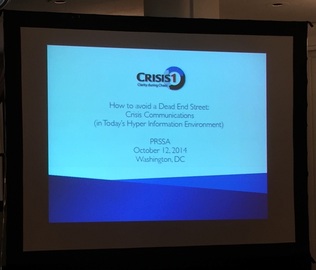 by Casey Braun One of the noblest things a person can do is help someone else in a time of crisis. That is why I think crisis communication is one of the most vital, exciting and rewarding areas of public relations. In the session “How to Avoid a Dead-End Street: Crisis Communications” at the PRSSA National Conference, APCO Worldwide Executive Director Kent Jarrell and Crisis1 President Pat Philbin spoke about their experiences in the crisis and issues management field. Both spoke about how in a world where incidents like the Virginia Tech shooting and other salacious news are becoming commonplace, it is more vital than ever for organizations to be vigilant and prepared. Further, it is important for practitioners to understand the fundamentals of crisis communication even if they think they will never need to use them. Philbin discussed the PESTEL framework for analyzing internal and external factors that can affect an organization. PESTEL stands for political, economic, social, technological, environmental and legal factors, all of which public relations counselors should be constantly researching and analyzing for risks and threats. Philbin went on to discuss how in a communication landscape like ours, it is important for practitioners to be able to engage in conversation about these factors. “In this politically correct age we live in, it’s almost impossible to have good discourse about anything,” Philbin said. It is the job of public relations practitioners to begin discourse about key issues in their organizations to help identify issues and plan for crises. Jarrell discussed different methods for predicting crises, including scenario mapping using a four quadrant model and risk ranking. “If you can determine how the risk will be assigned to certain stakeholders…what’s in the top right quandrant…is the most likely occurrence and could be the most catastrophic. That’s preplanning. But it’s the same model you use if a crisis breaks,” Jarrell said. Both speakers emphasized a need for sincerity, protecting people first in a crisis and facilitating knowledge and understanding. “In our business, integrity is the only currency you have,” Philbin said. “People are generally forgiving of mistakes, but people won’t forgive if they perceive that [organizations] don’t care or aren’t doing all they can… People want to know that you care before they care what you know.” Both provided more tips for communicating during a crisis, such as:
Both speakers concluded their portions discussing the most important element of effective crisis communication: telling the truth. “Communication has to be directly to policy or the truth… It starts at the top. You have to have a CEO or an effective management team that understands that without having a communications component, we are at risk,” Jarrell said. “Trust equals 1) doing the right things well and 2) communicating them well,” Philbin said. Basic crisis communication principles seem relatively basic. However, many companies and executives still get themselves in trouble by not understanding the basic tenets of what publics really want to know from a company and the best ways to communicate that information. Research, pre-planning, issues scanning and telling the truth are essential to preserving an organization’s reputation during a crisis.
0 Comments
by Gabrielle Woodard There aren’t many people who see the opportunities provided by practicing public relations in the government or political realm. One thing to know is, often times, in the political world public relations is referred to as public affairs. As defined by prdaily.com: “Public affairs relates to matters that concern the public directly. This could include legislation, policing, and public administration, as well as other elements. Public relations on the other hand, focuses more on the company’s connection with the public."  Photo Courtesy: Elline Concepcion Photo Courtesy: Elline Concepcion So, just know that as a PR practitioner, you are capable of doing public affairs work. In the political PR session at PRSSA National Conference the main speaker was Bob Lehrman, who currently works for the Federal Communications Commission. Lehrman got his first job thanks to one of his classmates at Tuft’s University, Kurt Vonnegut. Lehrman said after he was awarded the job he was able to read the letter in which Vonnegut had written. In the recommendation letter, Vonnegut had said he believed Lehrman was qualified for the job but would do much better in Hollywood. Due to the audience’s particular interest in internships within political public relations, Lehrman recommend when applying to internships to “cast a wide net” and apply to many places. He also recommended to “pick something you’re fascinated by” because when you are very interested in something, you are more likely to learn while doing it. Lehrman emphasized multiple times to research the organization and know as much as you can about it before interviewing. Much like the corporate world, government agencies want you to know the organization for which you are interviewing to the fullest extent possible. I highly recommend anyone interested in any kind of public relations researches jobs offered within the government. There are jobs in the corporate sector, non-profit and agency. Government jobs often provide stable work and allow for growth within multiple organizations. |
Archives
February 2024
Categories
All
|
 RSS Feed
RSS Feed
